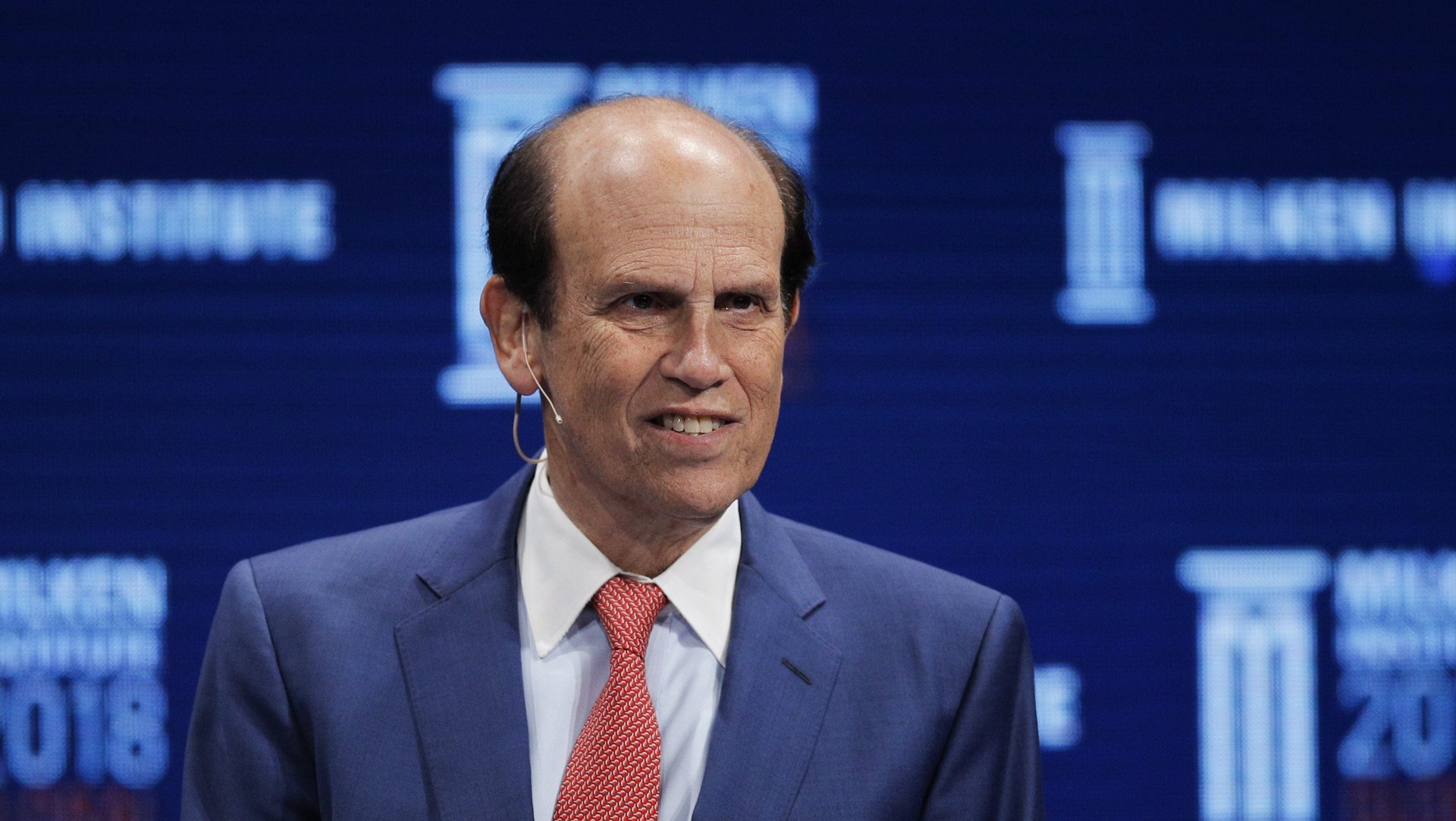Michael Milken is the “junk bond king” everywhere except on MikeMilken.com
US financier, philanthropist, and think-tank founder Michael Milken made his name creating and profiting spectacularly from the high-yield bond market, an achievement that earned him the nickname “the junk bond king.”


US financier, philanthropist, and think-tank founder Michael Milken made his name creating and profiting spectacularly from the high-yield bond market, an achievement that earned him the nickname “the junk bond king.”
The sobriquet, used most often during the peak of his career in the 1980s, which concluded with the 1989 fraud charges that led to his imprisonment and lifetime ban from the US securities industry, still pops up in recent mentions in outlets including The New York Times, The Wall Street Journal, Bloomberg, Time, Business Insider, and the Los Angeles Times. Start typing “junk bond king” into a Google search bar and Milken’s name and photograph pop up before you’ve finished.
But there is one corner of the internet fighting staunchly to erase this part of Milken’s legacy, and that is MikeMilken.com.
Milken’s surprisingly clunky personal website debuted on the internet on April 25, 2000, and has been updated frequently over the years to include references to Milken’s various charitable projects, and to seemingly every positive reference to the former financier that has ever appeared in print (with PDF uploads of the ones that haven’t made it online).
Understandably, the site focuses on Milken’s work over the last few decades on healthcare (he is a survivor of prostate cancer), education, research, and the Milken Institute think tank, which is holding its annual global conference this week in Los Angeles.
Tucked inside a 5,100-word biography is a 120-word paragraph acknowledging his brush with the law. “Although such conduct had never before (nor has since) been prosecuted criminally—a fact rarely mentioned in press reports—he resolved the case without a trial to prevent further impact on his family,” it reads in part. “After paying a $200 million fine and serving a one-year-and-10-month sentence, he resumed the philanthropic work he had begun in the 1970s. A few years later, 98 brokerage firms and banks charged with conduct similar to that in the Milken case were simply fined in civil actions.”
At the end of the biography, reporters and editors are asked to visit a web page offering to “help you to avoid having to run a correction,” with a link to another page entitled “The Mythology of Michael Milken.” It offers rebuttals to 16 so-called Milken myths, number seven of which has to do with his title. It reads:
“Milken is a philanthropist, financier, medical-research innovator, author, foundation executive, public health advocate, corporate officer, husband, father and grandfather. The hackneyed epithet ‘junk bond king’ was coined by Milken’s old Wall Street competitors from the 1970s and ’80s to dismiss the significance of his work. It was then picked up by The New York Times and has been parroted ever since.”
The item goes on to describe the breadth of Milken’s financial activities before working to an impassioned conclusion.
“What exactly is a ‘junk bond king’? Did the press refer to Bill Gates as the ‘software king’ because he controlled more than 90% of the operating system market? … [R]esponsible publications have come to consider ‘junk bond king’ a lazy cliché—like ‘Panamanian strongman’ or ‘intrepid traveler’ or ‘the powerful House Ways and Means Committee.’ Milken is not—and was not—king of anything.”
The author of the text is not named.
The intensity of the site’s disavowal of any connection to junk bond royalty has changed over the years. A 2002 iteration said simply that he’d “admitted conduct that was determined to comprise five violations but that had never before (and has not since) been subject to criminal prosecution. He was assessed a $200 million fine and incarcerated 22 months. Immediately after paying this debt, he resumed his philanthropic activities.”
The 2004 version appended a new sentence: “Milken has promised that he will someday write his side of the controversy; but for now he feels it’s less productive to focus on the past than to be involved in supporting the effort to accelerate medical solutions.”
By 2008, the promise of a forthcoming tell-all was gone, replaced with the language that is there today.
Following his release from prison, Milken could have holed up in a luxury residence with his resentments and his remaining fortune. To his credit, he has instead committed an enormous amount of money, time, and effort to philanthropic causes with benefits that arguably extend beyond the rehabilitation of his image. To echo his own ghostwriter, it seems less productive to focus on the past—and on controlling his public narrative down to the word—than to move ahead and let history reach its own conclusions.